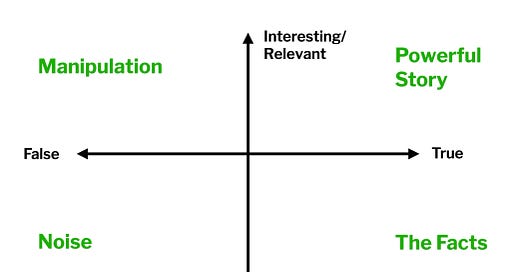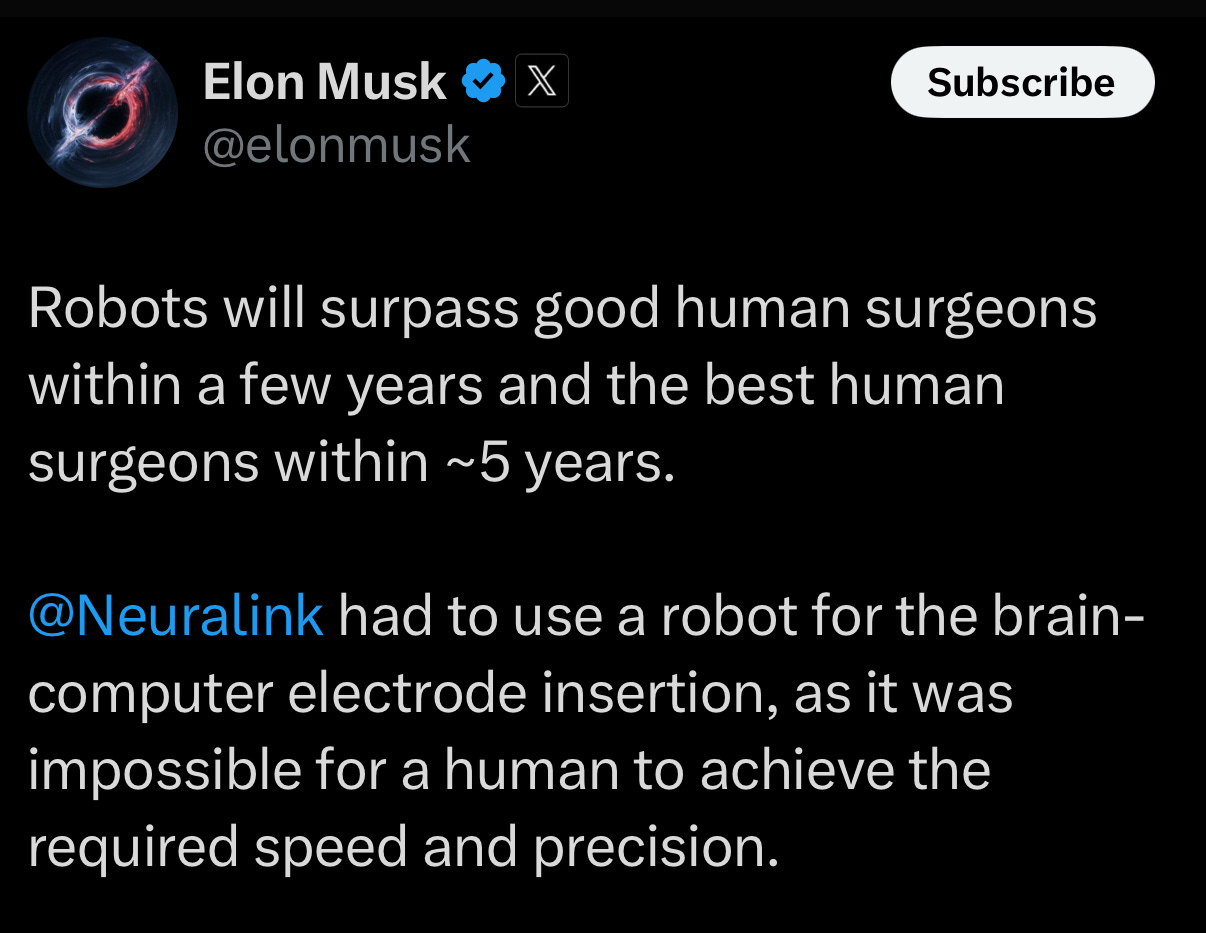Silicon Valley is steeped in exponential thinking and manic, irresistible ideas. This week we get a tastes of it with a couple of predictions that bust the glass ceiling of medicine: the obsolescence of surgeons and disease. All in one week.
Powerful stories
This post from Seth Godin is pure gold. In super short-form he covers the communication landscape of facts, noise, manipulation and powerful stories. And literally everything I read and see in the media fits in to one of these four quadrants. Amazing. I have to confess that I’m not always in the powerful story quad.
And why manipulation isn’t resilient…
Manipulation isn’t resilient, because sooner or later, we discover that the world doesn’t work the way we were led to believe.
Raising a child in the digital age
Amanda Hess in the New York Times writes about challenges of raising a child with a rare syndrome and questions her place in disclosing the private details of her child’s condition. This resonated with me — I have seen so many young parents create platforms around their children and I’ve always had real concerns. The story is beautifully written, and long-form. It should be outside the paywall. She has a book coming out next week: Second Life: Having a Child in the Digital Age. It looks great.
Favor: I’d like to get Ms. Hess on the podcast but I haven’t heard back from the Doubleday publicists. If anyone has her contact information it would be super appreciated. You can ping it on over to fox42@me.com
The last letter
This is a really powerful essay on some WWII French resistance fighters who put pen to paper before facing the firing squad. I can’t begin to imagine what I would write in the moments before my death. Their dying words can teach us how to live.
Once you realise that your days are numbered, that other emotions are competing for time and space in your life, answering them offers a chance to reorient yourself amid all the noise and contempt: ‘It is time, before disappearing in the trembling of an Earth without hope, to be entirely and definitely love, tenderness, friendship, because there is nothing else…
The end of disease
In keeping with a theme of wild, escape velocity predictions, the CEO of Google DeepMind, Demis Hassabis, appeared on 60 Minutes a week ago and predicted the end of disease. Ya, you heard that right. For the medical/chemistry geek set, Derek Lowe in In the Pipeline (a very popular newsletter) apologetically details why Hassabis is wrong about this prediction. Lowe is a really smart and writes lots about pharma/R&D. This kind of platitude-busting thinking keeps it all real.
And some ideas of my own about Elon Musk’s prediction of robots replacing surgeons:
Musk and the surgeon’s asteroid moment
This nonsense about doctors being replaced by machines has to stop.
A couple of weeks ago it was Bill Gates. This week it’s Elon Musk, predicting that within five years, the best surgeons will be eclipsed by robotics. He points to Neuralink, suggesting that its probe could only be placed with robotic precision — beyond the reach of mere humans.
Apparently this is our asteroid moment. Or the surgeon’s asteroid moment.
And I’ll take on one of the most visionary minds of our time: Musk’s prediction won’t bear out. Surgeons won’t be replaced — but they will be radically redefined.
Ethan Goh, Executive Director of Stanford ARISE (AI Research and Science Evaluation), recently posted a sharp reminder on LinkedIn of why some kinds of automation are a problem.
Much of a doctor’s work involves real-time communication and dynamic decision-making:
Managing a deteriorating patient
Navigating family and caregiver discussions
Coordinating with nurses, specialists, and teams
Exploring patient expectations and concerns
Today’s AI still struggles to integrate and reason across messy, fragmented real-world inputs.
His comparison of doctors to airline pilots — trained experts who adapt to chaos when the autopilot falters — is worth a read.
I always like to pose the question: instead of asking what the future will be, we should be asking what future we want.
As physicians and educators we can and should choose to design our interactions, shape the boundaries of our technology and participate in the creation of our future. Technology is not necessarily deterministic — or it shouldn’t be. And just because a set of technologies can do something autonomously doesn’t mean it should.
If we stay passive, we’ll get a future envisioned by Elon Musk. If we engage, we can shape one worth living — for us, and for our patients.
Thanks for reading. Please pass this along to someone who might like it.




